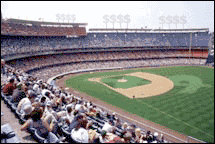Baseball Contraction Primer
Updated February 21, 2017 | Factmonster Staff 

Labor Pains
A guide to Major League Baseball's contraction issue
 |
The decision made by Major League Baseball owners to contract two teams before the 2002 season was the first punch thrown in what appears to be a winter-long battle royal over the future of America's national pastime.
The vote, which occurred one day before the league's collective bargaining agreement with the players' union was set to expire, is most likely the owners' attempt to gain some leverage in renewal discussions.
The vote, which occurred one day before the league's collective bargaining agreement with the players' union was set to expire, is most likely the owners' attempt to gain some leverage in renewal discussions.
|
But by threatening to pull two franchises out from under their respective cities and fans, the owners have drawn a slew of state legislators, lawyers, stadium owners, judges, members of Congress, and outraged fans into the mix.
If you think of offseason owner-player negotiations as one of those all-too-familiar, on-field brawls, the owners have essentially opened up the gates and let the grounds crew, umpires, concession vendors, and fans join in the pig pile.
The contraction debate is just the latest dispute to come down the pike in what has become a traffic jam of issues concerning baseball's financial future.
If you think of offseason owner-player negotiations as one of those all-too-familiar, on-field brawls, the owners have essentially opened up the gates and let the grounds crew, umpires, concession vendors, and fans join in the pig pile.
|
Back to the Bargaining Table
The collective bargaining agreement outlines things such as player's minimum salaries, the rules for arbitrating players' contracts, and revenue sharing between the teams. The last agreement was signed in 1995 and ended a 232-day players' strike, the eighth work stoppage in league history.
The results of contraction-related litigation and the details of this new agreement will ultimately decide the fate of Major League Baseball.
The results of contraction-related litigation and the details of this new agreement will ultimately decide the fate of Major League Baseball.
Here are the two major players in the contraction debate:
| The Owners Represented by Baseball Commissioner Bud Selig Baseball's 30 owners claim that operating expenses, i.e. player salaries, have skyrocketed the past two decades and running a profitable team is nearly impossible under the current conditions. By eliminating the least productive teams there will be fewer owners to share the league's $3.5 billion revenue pool. | The Players' Union Represented by Baseball Labor Leader Donald Fehr The MLB Players' Association, which filed a grievance against the league a day after the vote, contends that the owners can only blame themselves for the higher salaries. And cutting two teams (or 80 jobs from two 40-man rosters) isn't going to solve their problems. |
A Revealing Debate
The history of the business of baseball begins a historic new chapter this week when Commissioner Selig takes the contraction issue to Capitol Hill. Selig said he will open up the teams' financial ledgers for the public to see during testimony in front of the House Judiciary Committee.
Congress wants to, in turn, discuss baseball's 79-year-old antitrust exemption. The 1922 Supreme Court ruling held that baseball exhibitions did not constitute interstate commerce, placing it outside the country's antitrust laws—a decision Justice William O. Douglas called "a derelict in the stream of the law" a half-century later.
Congress wants to, in turn, discuss baseball's 79-year-old antitrust exemption. The 1922 Supreme Court ruling held that baseball exhibitions did not constitute interstate commerce, placing it outside the country's antitrust laws—a decision Justice William O. Douglas called "a derelict in the stream of the law" a half-century later.
Interesting facts
|
• Eliminating the Twins and Expos would leave 15 National League teams and 13 American League teams. Arizona, which agreed to waive its right to block any league-imposed realignment through 2002 as part of its expansion deal in 1998, would be the easiest to switch leagues. That would mean the NL pennant winner would be playing in the AL in 2002.
• The Marlins and Devil Rays' home state—Florida—is governed by Jeb Bush, brother of baseball's First Fan and former Texas Rangers owner President George W. Bush.
The Montreal Expos average home attendance was 7,935 in 2001. There were 11 minor league baseball teams that finished 2001 with a higher per-game average.
• The Marlins and Devil Rays' home state—Florida—is governed by Jeb Bush, brother of baseball's First Fan and former Texas Rangers owner President George W. Bush.
|
See also:
